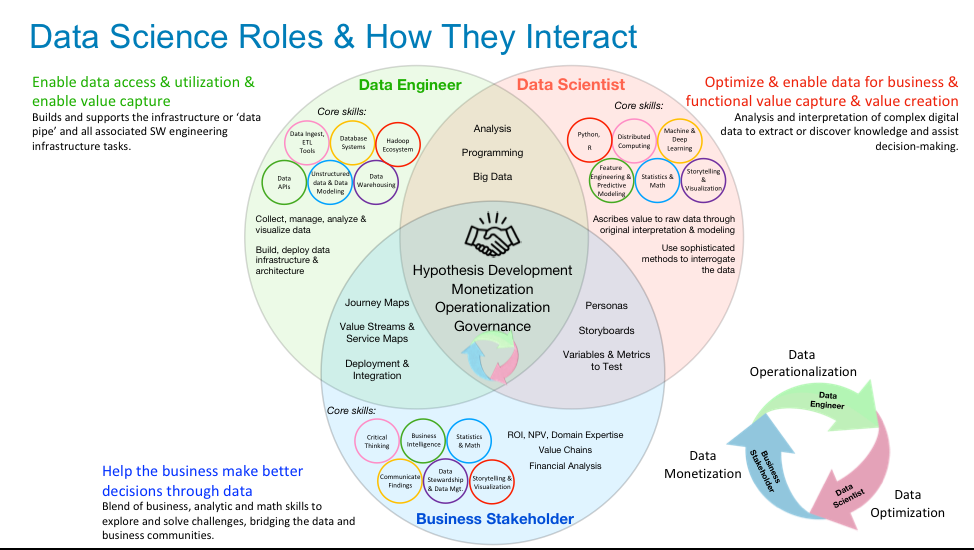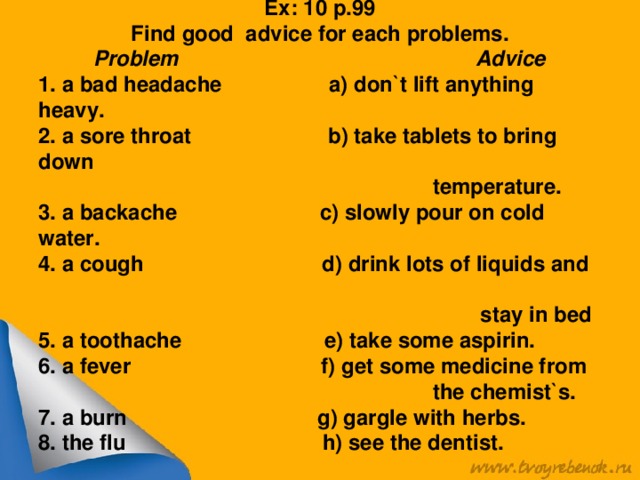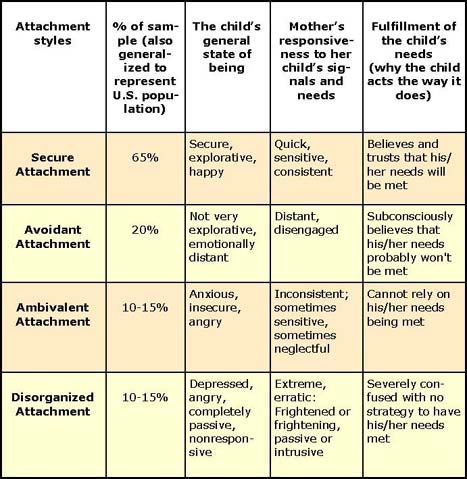Histrionic personality disorder mother
Histrionic personality disorder
Histrionic personality disorder… It starts at an early age. They are overly emotional. They trouble themselves with almost every bad situation and cry. They constantly expect attention. They feel uncomfortable in situations where they are not the centre of attention.
Striking clothes, seductive behaviour and talk is often used. They are unable to form a deep emotional relationship, they remain superficial. They don’t take much into account what effect their behaviour has on others. The main aim is to impress others. The content does not matter. Their manner of speaking is aimed at making an impression on others and lacks content. They show off, have an artificial mannerism and display their emotions in an excessive and exaggerated fashion. In short, they display theatrical behaviour. They are open to suggestions and are easily influenced. In spite of all this they believe that relationships should be more intimate than they are. In summary, they are people who try to draw attention to themselves, give a positive and emotional impression, who appear as if they are role-playing, and who are thinking of nothing else other than impressing others.
Compared to Narcissists they take more care in their attitude towards people around them. The tendency to all over sudden want to help, statements like “I will save you from this problem”, whereas they actually are unable to consider or love anyone other than themselves, are the main traits of this personality. Everything gets sexualized. If you ask them they are not sexualizing. In fact they think of everything other than sex. The condition is not only seen in women but also in men. Usually there is a problem in the mother-father-child triangle. They are trying to be “the father’s daughter” or the “mother’s son”. Girls have serious conflicts with the mother, boys with their fathers. They seem to be constantly squabbling. In summary, they are unhappy people. But they give the appearance of being happy. In fact, this is called “la belle indifference”… It is a special symptom. Judging by the impact the condition has on those people close to the person, it must be very hard to be the son or the daughter of a histrionic.
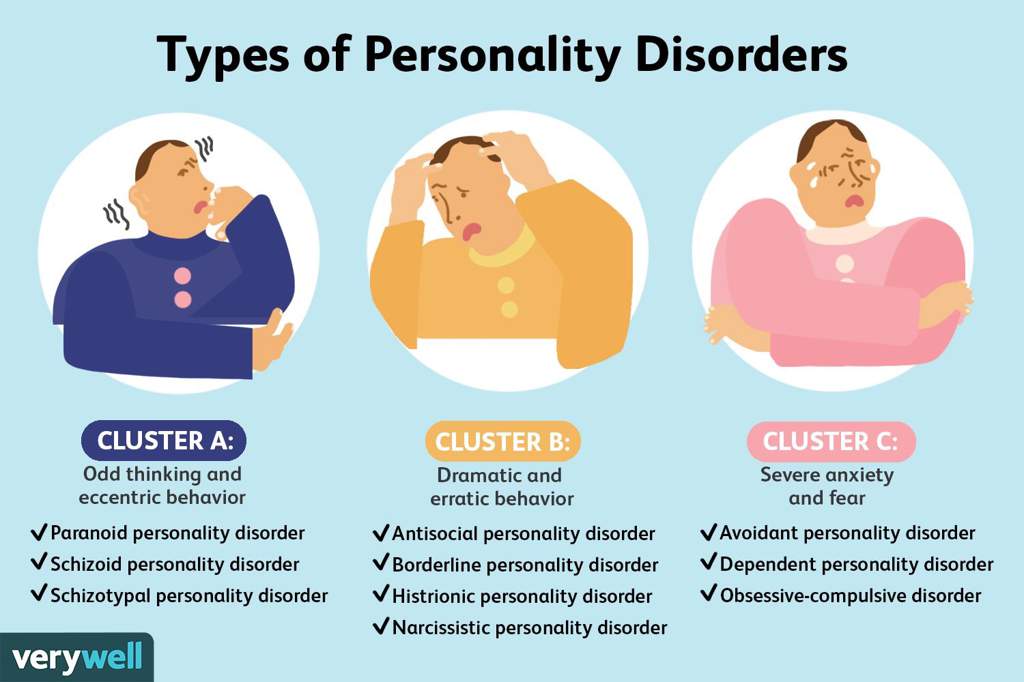 A mother or father who is constantly trying to seduce you… This must really be traumatic. It is clear that for a histrionic the main issue is the constant need for love, and the use of exaggeration, sexuality, in other words every means possible in order to receive it. They want to be the centre of the world. Unfortunately this is not possible and the histrionic person is condemned to be unhappy until the end of his life! And as the biological parameters are not well known there is no proper treatment either. What remains is only the long and difficult therapy technique of psychoanalysis… Strangely, it is known that at least one out of three histrionics have anti-social tendencies. I think that this has something to do with not knowing any bounds and believing that in reality everything belongs to them. In this disease often encountered in our country there is another point which caught my attention and which I am studying: their inability to divert their attention… When they set their mind on something, they never give up and are only interested in that… In fact, when they experience difficulties they get angry and display the same kind of anger they show when they are not the centre of attention… Anyhow, the main outcome of a successful treatment is surely the realization that the individual is too small to sit at the centre of the universe.
A mother or father who is constantly trying to seduce you… This must really be traumatic. It is clear that for a histrionic the main issue is the constant need for love, and the use of exaggeration, sexuality, in other words every means possible in order to receive it. They want to be the centre of the world. Unfortunately this is not possible and the histrionic person is condemned to be unhappy until the end of his life! And as the biological parameters are not well known there is no proper treatment either. What remains is only the long and difficult therapy technique of psychoanalysis… Strangely, it is known that at least one out of three histrionics have anti-social tendencies. I think that this has something to do with not knowing any bounds and believing that in reality everything belongs to them. In this disease often encountered in our country there is another point which caught my attention and which I am studying: their inability to divert their attention… When they set their mind on something, they never give up and are only interested in that… In fact, when they experience difficulties they get angry and display the same kind of anger they show when they are not the centre of attention… Anyhow, the main outcome of a successful treatment is surely the realization that the individual is too small to sit at the centre of the universe. And who knows, maybe it is to settle for a quiet prayer…
And who knows, maybe it is to settle for a quiet prayer…
Elderly Histrionic Mother
Question:
My elderly parents live in another state, my father has cancer that will be terminal. I am going out more frequently to make sure they’re taking care of themselves, and to handle the chores. My mother has a histrionic personality that is very alienating. I have many avoidant/schizoid traits. Without my father in her life, she will have increased difficulties in relating to the world. It’s difficult for me to interact with her, but I do want to make sure she can function after Dad’s death. Is there some reference work you might recommend that might help me bridge this gulf of personalities? I know it will only be a temporary bridge, but I feel I need to convince her to move into a retirement community where she won’t fall prey to scammers who with a little sweet talk can easily take advantage of someone with her personality. Thank you.
This Disclaimer applies to the Answer Below
- Dr.
 Dombeck responds to questions about psychotherapy and mental health problems, from the perspective of his training in clinical psychology.
Dombeck responds to questions about psychotherapy and mental health problems, from the perspective of his training in clinical psychology. - Dr. Dombeck intends his responses to provide general educational information to the readership of this website; answers should not be understood to be specific advice intended for any particular individual(s).
- Questions submitted to this column are not guaranteed to receive responses.
- No correspondence takes place.
- No ongoing relationship of any sort (including but not limited to any form of professional relationship) is implied or offered by Dr. Dombeck to people submitting questions.
- Dr. Dombeck, Mental Help Net and CenterSite, LLC make no warranties, express or implied, about the information presented in this column. Dr. Dombeck and Mental Help Net disclaim any and all merchantability or warranty of fitness for a particular purpose or liability in connection with the use or misuse of this service.

- Always consult with your psychotherapist, physician, or psychiatrist first before changing any aspect of your treatment regimen. Do not stop your medication or change the dose of your medication without first consulting with your physician.
Answer:
People with histrionic personalities crave attention, and are willing to act in flamboyant, showy and manipulative ways to secure that attention. Their general approach is to be emotional rather than rational, superficial rather than deep, and passive-aggressive rather than direct. They tend to be very concerned with appearances. Because of this, they are often foolishly willing to extend trust to people who merely appear to be trustworthy, rather than actually being so. If your mother fits this description, I think you have some reason to be concerned for her welfare. Even so, I wouldn’t focus exclusively on the personality issues or on how gullible she may be. Ccon men and women are skillful at defrauding a range of personality types.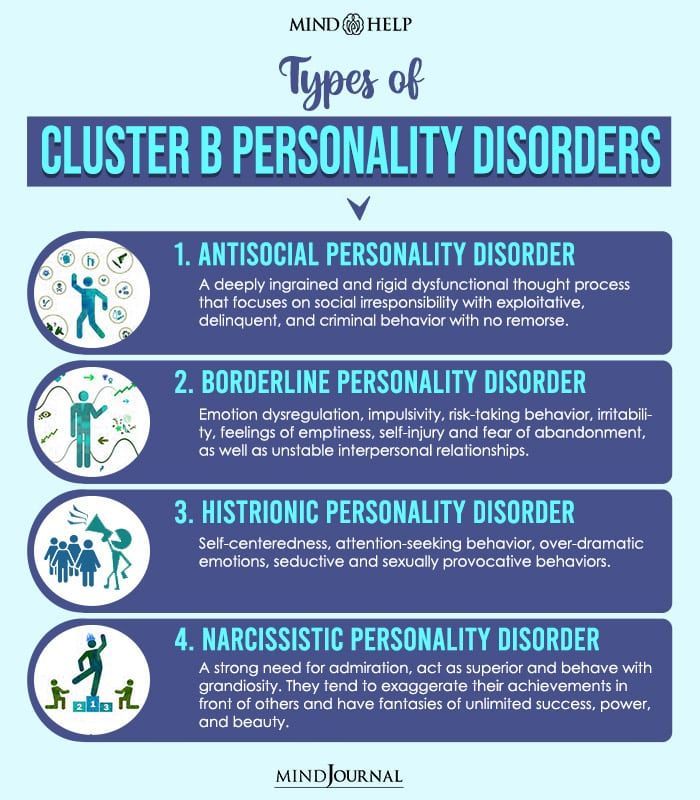 She is not alone in her vulnerability, and to the extent she is vulnerable, merely living in a retirement home will not protect her too well. The deeper issue is how to best provide for her future needs.
She is not alone in her vulnerability, and to the extent she is vulnerable, merely living in a retirement home will not protect her too well. The deeper issue is how to best provide for her future needs.
I would suggest that you contact an eldercare planning professional, perhaps a consulting social worker, who can help you to assess your mother’s needs and figure out what will be best for her with regard to her care needs, financial health and safety, and living situation. Other various professionals may need to be called in to assist with the planning, and of course, this should all be done as a family, with your mother and father both participating. Your father may be dying, but he isn’t dead yet. Mental Help Net has a detailed article on eldercare planning that you can read to get started with the process.
Your mother’s personality issues will likely need to be taken into account as you attempt to ‘sell’ various plan approaches. One thing about histrionic types is that they are succeptable to flattery.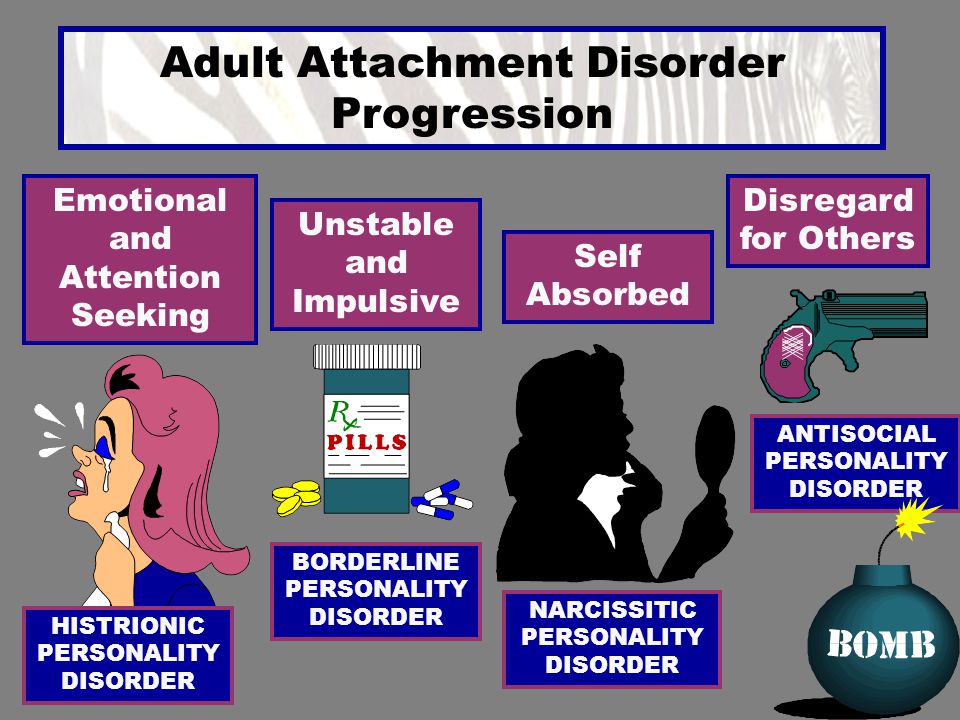 You can perhaps use this to advantage as you develop your care plan. Keep in mind also, that despite her personality issues, your mother is an adult and you will not be able to control what she will do until and unless she requires conservatorization. There is a degree of peace to be had in that truth, I think, if you look for it. At some point you will have done everything you could reasonably do to help ensure her welfare, and the rest will be out of your hands and in her own.
You can perhaps use this to advantage as you develop your care plan. Keep in mind also, that despite her personality issues, your mother is an adult and you will not be able to control what she will do until and unless she requires conservatorization. There is a degree of peace to be had in that truth, I think, if you look for it. At some point you will have done everything you could reasonably do to help ensure her welfare, and the rest will be out of your hands and in her own.
- Mark Dombeck, Ph.D.
More "Ask Dr. Dombeck" View Columnists
How to recognize histrionic personality disorder and what to do about it
August 7, 2020 Likbez Health
Stress will help to heal, and in order to start therapy, it is enough to detect five out of ten signs.
You can listen to the article. If it's more convenient for you, turn on the podcast.
If you have 100 acquaintances, about two of them have hysterical personality disorder.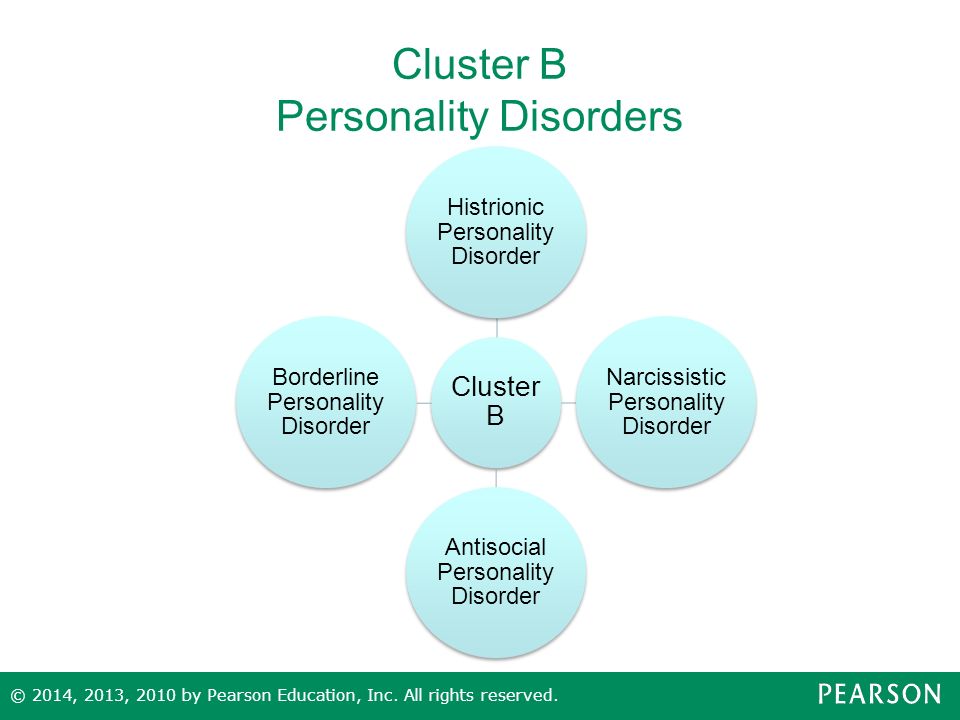 Most likely, these two are women.
Most likely, these two are women.
Histrionic personality disorder is diagnosed four times more often in women than in men.
But there is an assumption that in the case of men, hysterical traits - demonstrative behavior, a thirst for recognition, emotional outbursts, communication in raised tones - simply seem acceptable to society, natural, therefore, it seems, they do not require correction and treatment to a doctor. However, in fact, both men and women are hysterical with equal frequency.
Actually, for this reason, in English-language literature, the concept of "hysterical" (hysterical) was abandoned in favor of "dramatic, simulated, theatrical" (histrionic). The word "hysteria" comes from the ancient Greek "womb", which means that only women can suffer from a hysterical disorder. Histrionic disorder is not related to sex.
It is difficult to recognize a "dramatic" disorder. This conduct disorder (which is how the International Classification of Diseases ICD-10 defines hysterical personality disorder) often looks like openness, originality, a kind of cute expression characteristic of charming creative characters.
Nevertheless, there are important signs indicating that a person has crossed the line that separates eccentricity from a mental disorder.
What are the symptoms of histrionic personality disorder
The Diagnostic and Statistical Manual of Mental Disorders (DSM-5) lists 10 key features of this disorder. To suggest a hysterical personality disorder, it is enough to notice at least five of them in a person’s behavior.
1. Egocentricity
A person feels the need to be in the center of attention, to outshine others. If for some reason this is objectively impossible, he will try to attract attention by all available means.
For example, if a histrionic is a student at a lecture, he will interrupt the lecturer with questions, and if, let's say, he is just a guest at a party with a star, he will deliberately laugh out loud or even intentionally break something.
2. Demonstrative behavior
This is, for example, the habit of talking loudly, active gestures, exaggerated expression of emotions.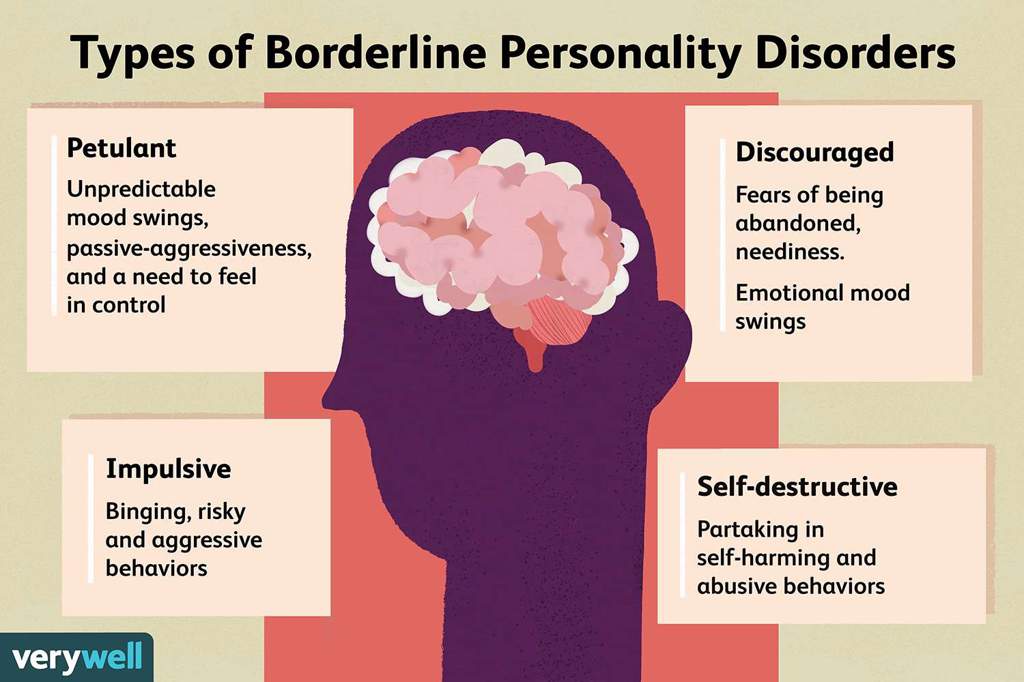 For example, if such a person sees a friend, he will not limit himself to a simple “Hello!” He throws himself on his neck and kisses him.
For example, if such a person sees a friend, he will not limit himself to a simple “Hello!” He throws himself on his neck and kisses him.
3. The tendency to consider relationships with people closer than they are
Familiarity is another characteristic feature of histrionics. A person really wants to be loved and accepted, so he unconsciously seeks to show that everywhere and for everyone he is “his own”.
Histrionic easily pours out his soul, sometimes even to casual acquaintances. True, he speaks only on a limited number of topics: for example, how many trials he passed with dignity, how he was admired, or, on the contrary, how callously and vilely he was betrayed.
4. Love for provocative outfits
Unusual, eye-catching clothing is one of the easiest ways to stand out from the crowd and attract attention. And the histrionic uses it to the fullest, choosing things in bright colors, adding abundant decorations and creating provocative sets.
5.
 Inappropriately seductive appearance or behavior
Inappropriately seductive appearance or behavior If the histrionic is a woman, she is a vamp. If a man is a mysterious macho. A person with this disorder needs compliments and knows that the easiest way to "squeeze" them from the opposite sex. Hence the undisguised sexuality that permeates the entire image.
6. An obsessive thirst for recognition and approval
A Histrionic should be admired - only then will he be complacent and satisfied. If he is not noticed or, even worse, criticized, he will make a dramatic scandal and leave, wringing his hands theatrically, slamming the door in parting.
7. Frequent and rapid mood swings
A person with a hysterical disorder is very emotional, and the most insignificant factors can cause a violent change of emotions. For example, a histrionic may sob sincerely when he loses a twenty or discovers that someone has not washed his cup again. But in a minute he will laugh just as sincerely when he hears an insipid anecdote from a significant person.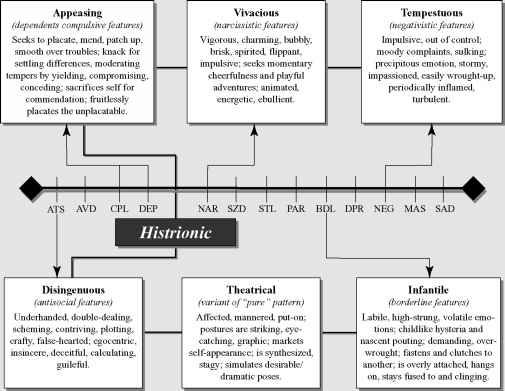
8. Hypersensitivity to criticism
It is difficult to discuss conflict issues with a histrionic, whether domestic or work. The slightest dissatisfaction or a request not to do this again, he immediately takes into account. And he begins to defend himself, often according to the principle "the best defense is an attack."
The search for a compromise turns into a quarrel with raised voices and becomes hopeless.
9. Suggestibility
Critical thinking, fact-checking, analysis are not about histrionics. His point of view is based on emotions: “It’s close to me, so it’s true.”
A huge influence on the formation of the views of a person with a hysterical disorder is exerted by authorities, that is, people who are personally significant to him. He perceives their words completely uncritically, often as the ultimate truth.
10. Deterioration in the quality of life due to behavioral characteristics
This is a common symptom of behavioral disorders: they ruin a person's life.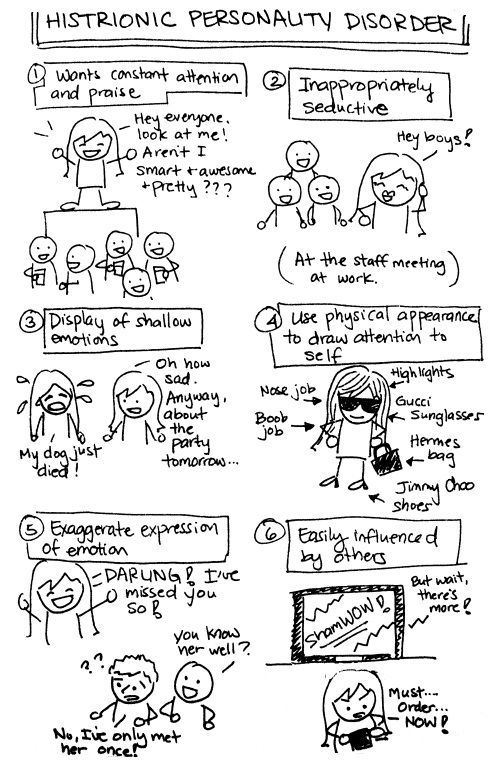
For example, an overly emotional histrionic, prone to dramatization, cannot build stable personal or business relationships: partners run away from him after the very first theatrical scandals.
Or another angle: because of the gullibility and love for revealing outfits, the histrionic now and then finds himself in risky situations.
Here is another example: due to the inability to be critical of himself, he cannot draw conclusions from past mistakes, so he falls into the same rake again and again, blaming anyone but himself for his problems.
What to do if a person has histrionic personality disorder
The most effective treatment for histrionic disorder is psychotherapy. The problem is that histrionics, as a rule, do not consider their behavior to require correction and are often not ready to turn to a psychotherapist.
The easiest way is to proceed as follows. Sooner or later, the histrionic once again gets hit on the forehead by life.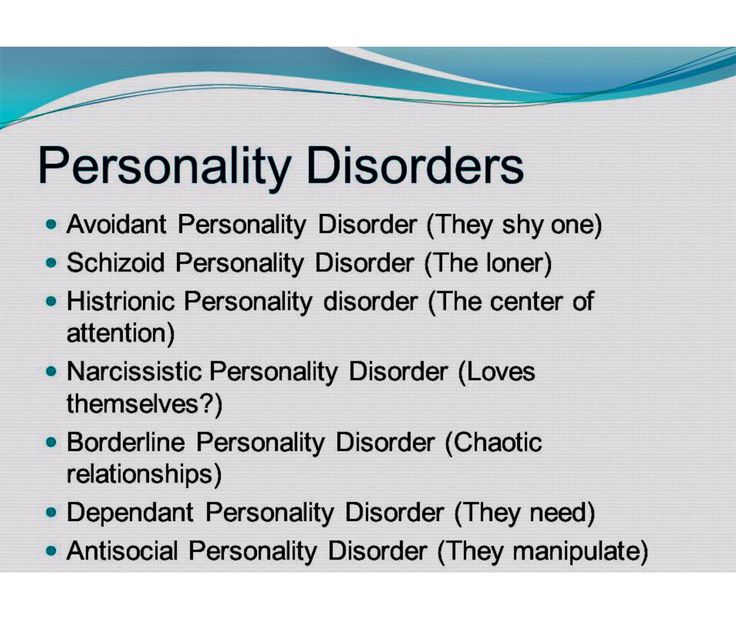 Against this background, he experiences severe stress, anxiety, sometimes he develops depression. It is at this moment that it is worth taking a person by the hand and leading him to a specialist. To begin with, to solve the “stress” problem, and after it, deal with histrionic disorder.
Against this background, he experiences severe stress, anxiety, sometimes he develops depression. It is at this moment that it is worth taking a person by the hand and leading him to a specialist. To begin with, to solve the “stress” problem, and after it, deal with histrionic disorder.
Most likely, the doctor will choose the so-called psychodynamic approach to work with the patient. It is based on psychoanalysis: with the help of a specialist, a person learns to understand what exactly makes him perform certain actions.
In the first step, the therapist will ask the patient to replace active behavior with words. For example, if a histrionic wants to throw himself on someone's neck, he should stop and explain to himself what is happening: "I'm glad to meet you." This deciphering of emotions, which should become a habit, helps to understand yourself and learn to communicate less theatrically with others.
Next, the psychotherapist will help the histrionic to realize that drama, excessive emotionality is just a way to attract attention, to feel significant.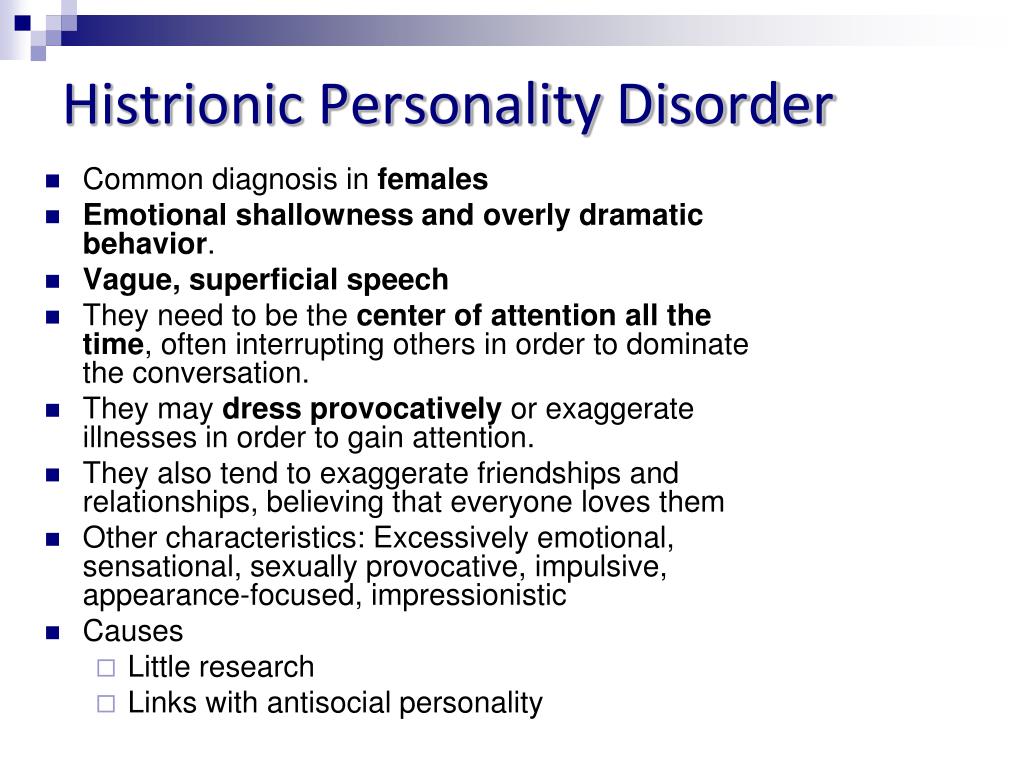 And he will tell you how to maintain self-confidence in other ways.
And he will tell you how to maintain self-confidence in other ways.
Unfortunately, it is impossible to predict how quickly psychotherapy will work. In some cases, it stretches over several years. You may also need to take medications - antidepressants, antipsychotics, mood stabilizers (so-called psychotropic drugs to stabilize mood).
Read also0101
Histrionic (hysterical) disorder - a directory of diseases - HealthInfo
Hysterical personality disorder - a personality disorder characterized by an insatiable desire to be in the spotlight, a tendency to dramatize, theatrical behavior, extravagance.
| Symptoms |
| People with this personality disorder are constantly seeking attention and relying on external effects.
|
| Causes |
| Hysterical accentuation of personality is formed as a result of upbringing in the family. Such children are often "family idols", whose desires are actually satisfied before their final formation. Emotional deprivation contributes to hysterical inclinations - the lack of emotional contacts with parents necessary for the child. Another theory about the causes of the formation of a hysterical personality is intra-family relationships during a child's adolescence. Adults somehow convey to him the message that people of different sexes do not have the same value and power. The child begins to consider his sex as a disadvantage, but at the same time learns to use it, because his sexuality gives him a certain power over the opposite sex. If during puberty the emerging sexuality of a girl (less often a boy) is rejected: the parent of the opposite sex becomes more and more distant, and the parent of the same sex becomes more and more competitive, hysterical accentuation or hysterical personality disorder is formed. |
| Diagnostics |
| A physician diagnoses a personality disorder based on marked disharmony in personality attitudes and behaviors involving several areas of life. In addition, the physician usually notes the inadequacy of the use of defense mechanisms. The use of these mechanisms is typical for all people, but in personality disorders they are inadequate and ineffective. |
| List of diagnostic methods: external examination and interview |
| Treatment |
| Although treatment is determined by the type of personality disorder, there are some general principles. Since most people with personality disorders do not see the need for medical attention, the impetus usually comes from someone else. The therapist constantly draws attention to the undesirable consequences of incorrect behavior, sometimes recommends that certain rules be observed and draws the patient's attention to the surrounding reality. The involvement of relatives in psychotherapy is extremely useful and important, since their influence is often very effective. Group and family therapy, participation in therapy groups and self-help groups can also be helpful in the treatment process. If a patient with a personality disorder develops other conditions, such as depression, phobia, anxiety or panic, medications are prescribed, but in this case they provide only partial relief. Moreover, people with personality disorders often violate their medication regimen and attempt suicide. |
 Their behavior is characterized by demonstrative, theatrical. Due to their liveliness and expressiveness, people with hysterical disorder easily establish relationships with other people, but these relationships are usually superficial. Emotions often appear exaggerated, childish, and designed to elicit sympathy and attention (often erotic or sexual) from those around them. People with hysteria tend to engage in sexually provocative behavior and eroticize non-sexual relationships. They may not actually desire sexual intercourse, rather their behavior masks a desire to be dependent and protected. Some hysterical individuals also suffer from somatoform disorders and, due to their inherent traits, exaggerate their physical problems in order to attract the attention of others to their person.
Their behavior is characterized by demonstrative, theatrical. Due to their liveliness and expressiveness, people with hysterical disorder easily establish relationships with other people, but these relationships are usually superficial. Emotions often appear exaggerated, childish, and designed to elicit sympathy and attention (often erotic or sexual) from those around them. People with hysteria tend to engage in sexually provocative behavior and eroticize non-sexual relationships. They may not actually desire sexual intercourse, rather their behavior masks a desire to be dependent and protected. Some hysterical individuals also suffer from somatoform disorders and, due to their inherent traits, exaggerate their physical problems in order to attract the attention of others to their person. 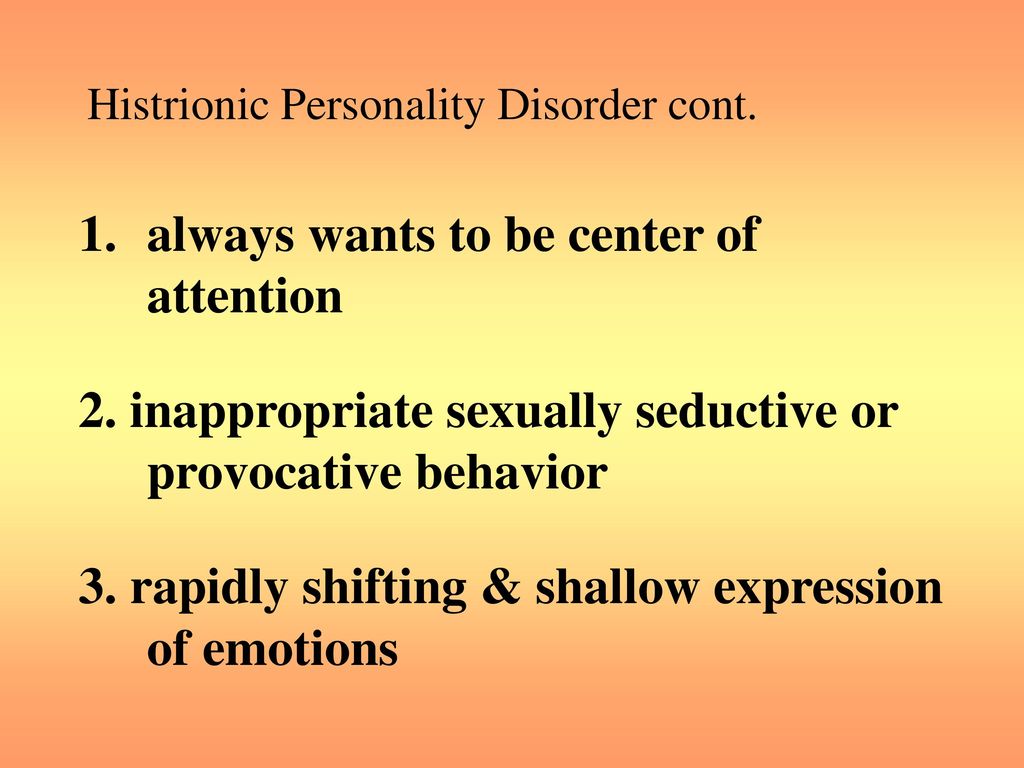 The nature of the psychiatric problems that patients experience (eg, depression, psychosis, affective reactions) depends in part on the type of disorder.
The nature of the psychiatric problems that patients experience (eg, depression, psychosis, affective reactions) depends in part on the type of disorder. 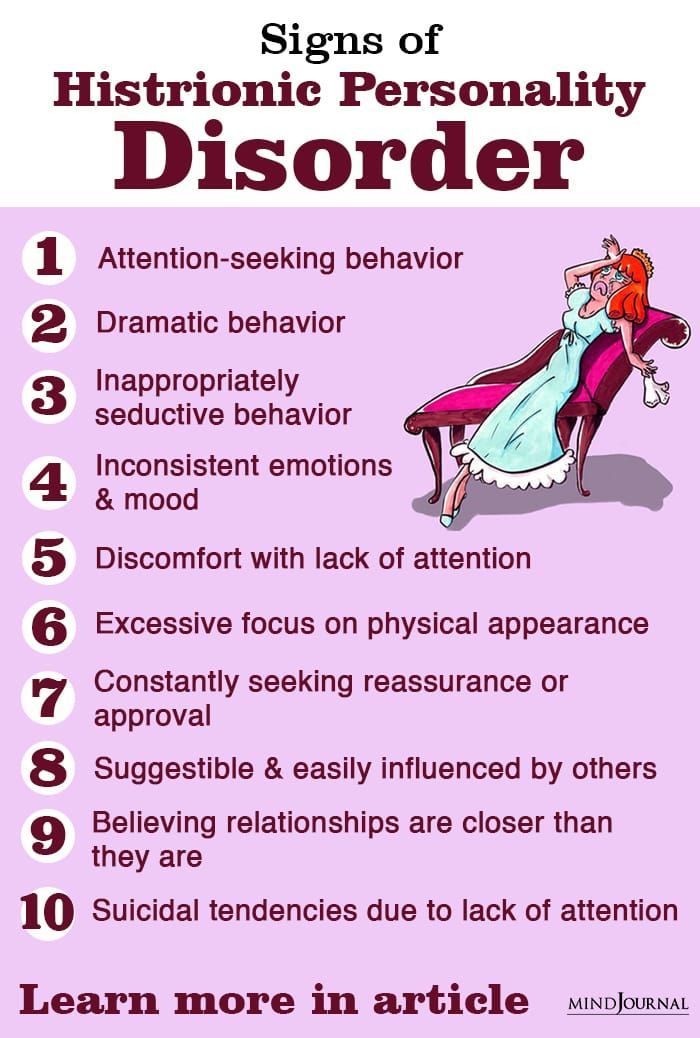 This usually happens in families where an authoritarian, unkind mother suppresses the initiative of children, deprives them of maternal warmth; the father, soft in character, does not enjoy authority in the family.
This usually happens in families where an authoritarian, unkind mother suppresses the initiative of children, deprives them of maternal warmth; the father, soft in character, does not enjoy authority in the family. 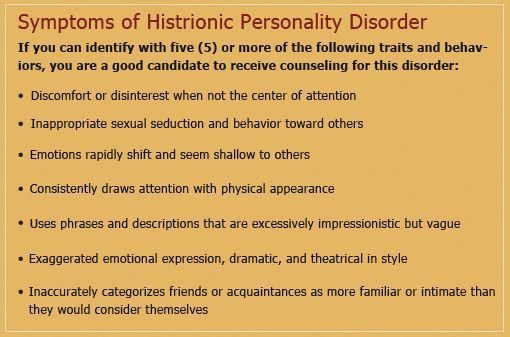 These include disturbances in emotional response, impulse control, perception and thinking, and style of relating to other people. These personality traits become apparent as the person stubbornly denies the need to correct their behavior despite its negative consequences.
These include disturbances in emotional response, impulse control, perception and thinking, and style of relating to other people. These personality traits become apparent as the person stubbornly denies the need to correct their behavior despite its negative consequences. 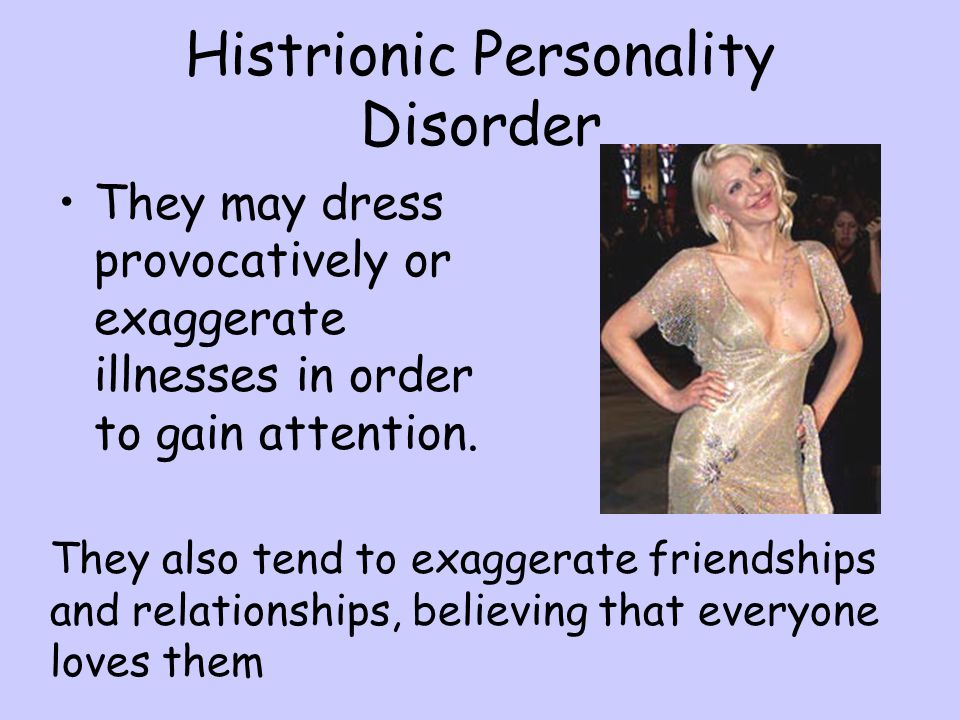 However, a person usually responds to a benevolent but insistent explanation that his style of behavior leads to negative consequences. Such clarification is usually more effective if it comes from relatives or a psychotherapist.
However, a person usually responds to a benevolent but insistent explanation that his style of behavior leads to negative consequences. Such clarification is usually more effective if it comes from relatives or a psychotherapist. 





